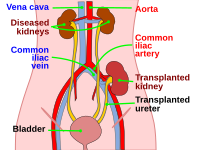
Photo from wikipedia
Kidney transplantation (KT) is the gold standard for renal replacement therapy in pediatric patients with end-stage renal disease. Recently, it has been observed that the outcome of pediatric KT is… Click to show full abstract
Kidney transplantation (KT) is the gold standard for renal replacement therapy in pediatric patients with end-stage renal disease. Recently, it has been observed that the outcome of pediatric KT is nearly identical to that in adults owing to the development and application of a variety of immunosuppressants and newer surgical techniques. However, owing to several differences in characteristics between children and adults, pediatric KT requires that additional information be learned and is associated with added concerns. These differences include post-KT complications, donor-recipient size mismatch, problems related to growth, and nonadherence to therapy, among others. This review was aimed at elucidating the clinical characteristics of pediatric KT that differ from those observed in adults.
Journal Title: Korean Journal of Pediatrics
Year Published: 2018
Link to full text (if available)
Share on Social Media: Sign Up to like & get
recommendations!